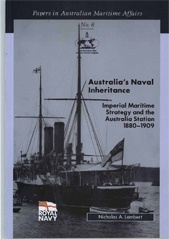Papers in Australian Maritime Affairs: Australia’s Naval Inheritance: Imperial Maritime Strategy and the Australia Station, 1880-1909

PDF : 12.71 MB
Abstract
This volume provides readers with the essential documents relating to the rationale and organisation of the naval forces on the Royal Navy’s Australia Station before the formal transfer of authority to the RAN in 1913. They show, firstly, that expert opinion always believed that Australia’s overriding defence concern was the protection of seaborne trade. A succession of naval authorities all insisted that Australia’s interests were most vulnerable - and could be attacked by a hostile power most decisively - through the interdiction of maritime commerce.
The volume also explores the relationship between the British Admiralty in London and successive Australian governments, and explains the reasoning behind the British advice (often found unpalatable) to State and later Commonwealth ministers. The documents demonstrate why, before 1909, the Admiralty was invariably justified in rejecting various proposals for the creation of a maritime defence force submitted by Captain (later Vice Admiral) Sir William Creswell and others, mainly on the grounds that they omitted to consider the all-important question of naval personnel.
The volume is divided into three parts. The first part draws most of its content from reports by senior British officers and closes with the Imperial Defence Act 1888 and the formation of the Australian Auxiliary Squadron. During this period the key themes in Australian naval debates were finance and force capability. The second and third parts focus on the Commonwealth era. Initially the Federal Government resolved that continuing to subsidise the Royal Navy presence in Australian waters was the most economical means of securing effective protection of Australian interests. But steadily increasing pressure, from members of the old naval brigades in particular, obliged statesmen to consider the establishment of an independent national force. For some Australians, the assuming of full political control of Australian naval units was more important than the issue of force capability.


